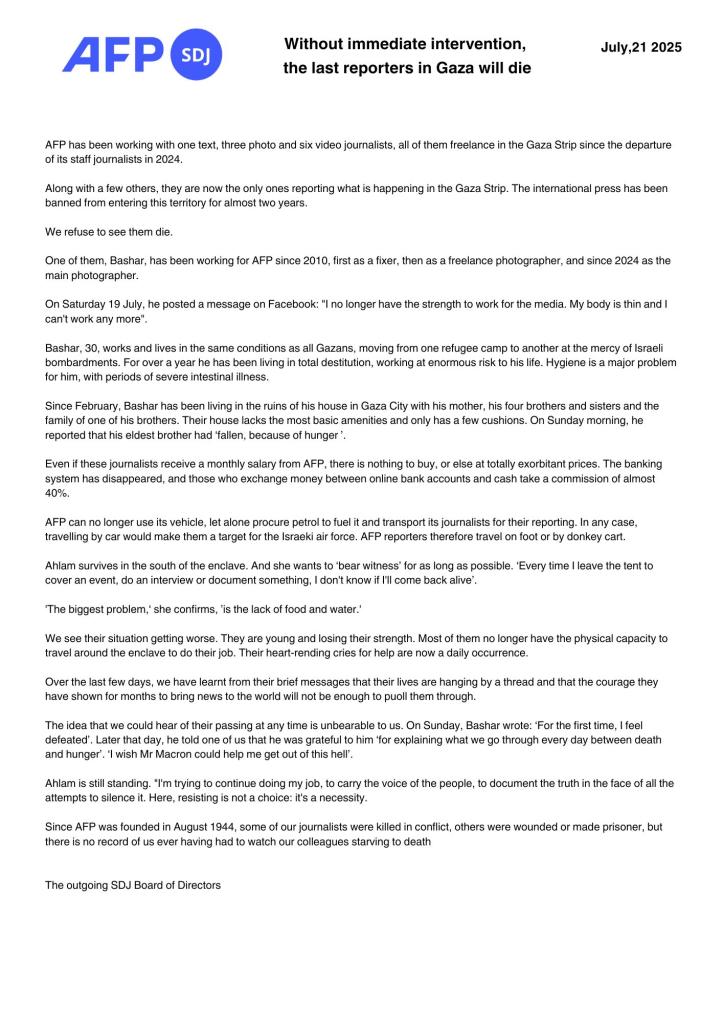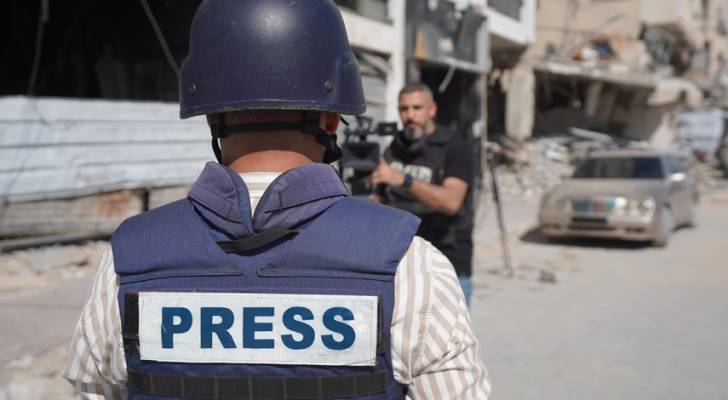AFP journalists issue unprecedented plea to save Gaza team from starvation
- AFP journalists warn Gaza team faces death from hunger: “Without immediate intervention, the last reporters in Gaza will die”
In a historic and urgent plea, AFP’s Société des Journalistes (SDJ) has issued a statement warning that their freelance reporters in Gaza are facing imminent death from starvation and exhaustion. The statement, released on July 21, 2025, marks the first time in the agency’s 80-year history that such a humanitarian alert has been issued on behalf of its own journalists.
“Without immediate intervention, the last reporters in Gaza will die,” the statement opened.
Since the withdrawal of AFP staff journalists from Gaza in 2024, the agency has relied on a team of freelancers - one text reporter, three photographers, and six video journalists - to report from inside the besieged territory.

“Along with a few others, they are now the only ones reporting what is happening in the Gaza Strip. The international press has been banned from entering this territory for almost two years,” the statement noted. “We refuse to see them die.”
The statement draws particular attention to Bashar, a 30-year-old photojournalist who has worked with AFP since 2010. “On Saturday 19 July, he posted a message on Facebook: ‘I no longer have the strength to work for the media. My body is thin and I can't work any more’.”
Bashar lives with his family in the ruins of their home in Gaza City, moving between camps in search of safety. “On Sunday morning, he reported that his eldest brother had ‘fallen, because of hunger’.”
Though these journalists receive monthly payments from AFP, the economic collapse inside Gaza has rendered salaries nearly useless. “Even if these journalists receive a monthly salary from AFP, there is nothing to buy, or else at totally exorbitant prices. The banking system has disappeared, and those who exchange money between online bank accounts and cash take a commission of almost 40%.”

Transport has become nearly impossible and extremely dangerous. “AFP can no longer use its vehicle, let alone procure petrol to fuel it and transport its journalists for their reporting. In any case, travelling by car would make them a target for the Israeli air force. AFP reporters therefore travel on foot or by donkey cart.”
Ahlam, another AFP journalist, continues to report from the south of Gaza. “And she wants to ‘bear witness’ for as long as possible. ‘Every time I leave the tent to cover an event, do an interview or document something, I don't know if I'll come back alive’.”
“‘The biggest problem,’ she confirms, ‘is the lack of food and water’.”
According to the SDJ, the situation for these journalists is deteriorating by the day. “They are young and losing their strength. Most of them no longer have the physical capacity to travel around the enclave to do their job. Their heart-rending cries for help are now a daily occurrence.”
“Over the last few days, we have learnt from their brief messages that their lives are hanging by a thread and that the courage they have shown for months to bring news to the world will not be enough to pull them through.”
“The idea that we could hear of their passing at any time is unbearable to us. On Sunday, Bashar wrote: ‘For the first time, I feel defeated’. Later that day, he told one of us that he was grateful to him ‘for explaining what we go through every day between death and hunger’. ‘I wish Mr Macron could help me get out of this hell’.”
Ahlam continues to hold on. “Ahlam is still standing. ‘I'm trying to continue doing my job, to carry the voice of the people, to document the truth in the face of all the attempts to silence it. Here, resisting is not a choice: it's a necessity.’”
The SDJ underscored that this crisis is without precedent in the agency’s long history: “Since AFP was founded in August 1944, some of our journalists were killed in conflict, others were wounded or made prisoner, but there is no record of us ever having had to watch our colleagues starving to death.”
The statement closes with a final, chilling reminder of what is at stake, as the SDJ Board makes its desperate appeal for immediate international intervention.




